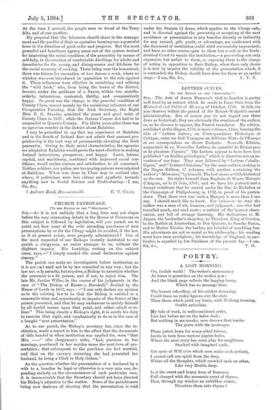LETTRES JUIVE S.
ITo THE EDITOR OF THE "SrFcrATOR."1 SIR,—The date of Aaron Monceca's visit to London is pretty well fixed by an extract which he sends to Isaac Onis from the Historical and Political Mercury of October, 1736. It falls (as you observe) within the period of Sir Robert Walpole's second administration. But of course you do not regard our three Jews as historical; they are obviously the creation of the author, or, as he chooses to appear, the French translator. My edition, published at the Hague, 1738, is in six volumes, l2mo, bearing the title of "Lettres Juives ; on Correspondence Historique et Critique, entre un Juif Voyageur en differens Etats de l'Europe et ses correspondens en divers Endroits. Nouvelle Edition, augmentee de xx. Nouvelles Lettres, de quantite de Remarques et de plusieurs Figures." The Letters appear to have been first published " en feuilles periodiques," which is therefore not an in- vention of our time. They were followed by " Lettres Cabalis- tiques," and" Lettres Chinoises," by the same author, making in the Hague Edition, 17 volumes, with another containing the author's " liemoires," by himself. The last seems as little historical as the rest. He styles himself Jean Baptiste de Boyer, Marquis d'Argens, ne le 24 Juin, 1704; and we have his portrait and a formal certificate that he served under the Due de Richelieu at the Campaign of Philipsbourg, in 1732, in proof of his preten- sions. That there ever was such a Marquis is more than I can say. I should much like to know. For (whoever he was) the author was a man of wit, humour, and judgment ; one who had travelled much, and read more ; a satirist of the keenest obser- vation, and full of strange learning. His dedications to M. Jaques, the bookseller's shop-boy, to Theodore, King of Corsica, to the Rabbis at Amsterdam, to Don Quixote, to Sancho Panza, and to Maitre Nicolas, the barber, are brimful of sparkling fun. His adventures are not so moral as his philosophy ; his reading must have been prodigious; his knowledge of England, in par- ticular, is equalled by few Parisians of the present day.—I am,










































 Previous page
Previous page